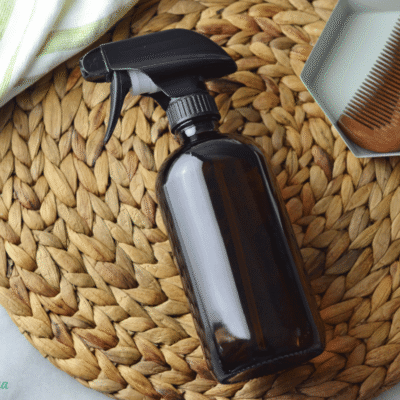I’ve been oil pulling with coconut oil for years. I read about oil pulling benefits a long time ago and how it may reverse tooth decay and help remineralize and whiten teeth. I’ve definitely noticed less plaque and better dental health since starting! Recently, I came across some articles online that questioned oil pulling and whether it could be dangerous.
Here’s what I’ve learned about oil pulling and its pros and cons for overall health.
What is Coconut Oil Pulling?
Oil pulling is an ancient practice that comes to us from Ayurvedic medicine, the traditional medicine of India. It’s long been used to promote oral hygiene and overall wellness by eliminating harmful bacteria and reducing plaque buildup.
The process involves swishing a tablespoon of oil for 5 to 20 minutes on an empty stomach and then spitting it out. The term “oil pulling” comes from the pulling and pushing of oil through the teeth, creating a washing machine sort of action. Oil pulling works by helping to break down plaque while cleaning the teeth.
The traditional Indian oral hygiene routine typically uses sesame oil. However, any type of oil can work, as long as it’s a cold-pressed edible oil. Olive oil, sunflower oil, and coconut oil are all popular choices. Coconut oil likely tastes the best!
Coconut oil may also be the most effective. It has a high “saponification index,” which means it can react with saliva to form a type of soap. The natural suds help reduce plaque and clean the teeth.
Benefits of Oil Pulling
Why do people practice coconut oil pulling? Oil pulling has many oral health benefits. Some of these include less plaque, reducing the severity of gingivitis, and less tooth decay. It can even lead to whiter teeth and potentially solve halitosis (bad breath).
The ability of oil pulling to reduce plaque may improve gum health, helping people avoid gum disease. In a 2009 study, oil pulling helped improve plaque-induced gingivitis. That’s really important because gingivitis can develop into periodontitis, a more severe gum disease that can lead to tooth and bone loss.
Oil pulling may also be your ticket to solving chronic bad breath. A study of 60 hostel students compared oil pulling to the prescription mouthwash chlorhexidine. The oil pulling was as effective at reducing bad breath as the prescription.
Coconut oil may be better than other oils for supporting dental hygiene due to its lauric acid. Lauric acid is an antimicrobial compound that kills harmful bacteria linked with tooth decay, like Streptococcus mutans.
What Do Dentists Say?
The American Dental Association (ADA) doesn’t recommend oil pulling due to limited scientific evidence showing it improves dental health. They say oil pulling may help remove debris from the teeth, which is great. But they believe oil pulling benefits are anecdotal or come from studies with limitations.
On the other hand, some studies do show promise. For example, some studies show oil pulling can help manage gingivitis and bad breath. The scientific evidence is adding up over time— it’s just not there just yet.
Critics of the ADA point out that their controversial recommendations for fluoride treatments and mercury fillings aren’t exactly supporting patient health. But as scientific studies on oil pulling accumulate, its efficacy may gain wide acceptance.
Coconut Oil Pulling Side Effects
While generally considered safe, there are some potential side effects of oil pulling with coconut oil. Thankfully, coconut oil pulling dangers are rarely serious.
Upset Stomach
Coconut oil’s taste and texture may make some people feel nauseated. Sometimes, that’s because they accidentally swallowed some. However, starting with too much oil can also cause nausea if it overwhelms the system. To avoid nausea, start with only 1 teaspoon and gradually work up to a tablespoon. Begin with 5 to 10 minutes rather than 15 to 20.
Jaw Soreness
Prolonged swishing (10 to 20 minutes) can cause fatigue or soreness in the jaw muscles, especially for those who grind their teeth or have TMJ issues. Again, start with 5 to 10 minutes of swishing rather than 15 to 20, and avoid clenching your teeth or swishing too vigorously. Over time, your jaw muscles will become stronger and you’ll build endurance.
Allergic Reactions
While uncommon, some people may be allergic to coconut oil. Symptoms may include irritation, itching, or swelling in the mouth, tongue, or throat. Some people may also develop skin reactions like rashes or hives around the mouth.
Stop oil pulling immediately if you experience any allergy symptoms. Rinse your mouth with water and seek medical attention. Use an oil like sesame or sunflower if you’re allergic to coconut.
Lipoid (Lipid) Pneumonia
Accidentally inhaling the oil while swishing could irritate the lungs or lead to an infection, like lipoid (or lipid) pneumonia. This is rare but possible if the oil is inhaled rather than spit out. Even if it were to happen, 40% of those with lipoid pneumonia have mild or no symptoms. It’s only if the oil is especially high in bacteria that it becomes dangerous.
To avoid this risk, sit upright while oil pulling to reduce the risk of inhaling the oil and only use a small amount at a time. Swish gently and then spit out. Lipid pneumonia from oil pulling is rare but can occur with improper technique. Swishing too vigorously can increase the risk of lipoid pneumonia, so take it easy.
It’s also important to note that oil pulling is not a substitute for dental care if you have an infection or periodontal disease (aka periodontitis). It’s also critical to continue good oral habits like brushing, flossing, and going to your regular dental check-ups. So, don’t throw out your toothbrush!
My Thoughts on Coconut Oil Pulling Dangers
Conditions like lipoid pneumonia are extremely rare when oil pulling is done properly. Coconut oil pulling is a safe oral care practice. But it needs to complement the regular use of high-quality (fluoride-free) toothpaste and mouthwash. However, those with coconut allergies or oral health issues should consult their dental provider before trying it.
Want to start coconut oil pulling? Here’s a good brand to use. You can also add some of this healthy mouth blend for extra oral health benefits.
Have you used coconut oil for oil pulling? Do you think it’s dangerous, and have you had any adverse effects? Share with us below!





